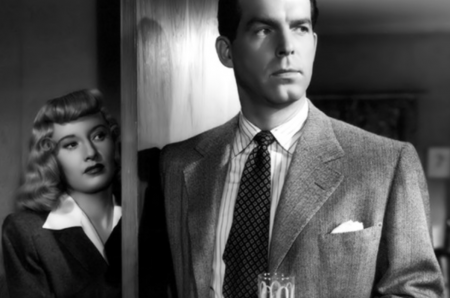 It’s that time of year again. Technically it’s spring, but less technically it’s “sprintertime,” in which the weather, somedays cold and gray, still feels an awful lot like wintertime. The best way to cure such April blues? Sunshine noir films, in which the typically dark and shadowy film noir genre – all private eyes, drifters, con men, and love triangles – are dragged into the sunlight, just like we want to be. Here are some iconic examples of the genre, all of which are book adaptations.
It’s that time of year again. Technically it’s spring, but less technically it’s “sprintertime,” in which the weather, somedays cold and gray, still feels an awful lot like wintertime. The best way to cure such April blues? Sunshine noir films, in which the typically dark and shadowy film noir genre – all private eyes, drifters, con men, and love triangles – are dragged into the sunlight, just like we want to be. Here are some iconic examples of the genre, all of which are book adaptations.
“Double Indemnity” (1944)
No less than Billy Wilder and Raymond Chandler adapted this James M. Cain novel about a woman (Barbara Stanwyck, swoon, swoon) who wishes her husband dead, and the insurance salesman (Fred MacMurray) she drags into her scheme. With Wilder also at the helm, the Los Angeles-set mega-noir is awash in noir staples: venetian blinds, cigarette smoke, bad-girl blondes; snapdragon banter, and clueless male marks. As the Star-Ledger’s Stephen Whitty says, “It’s got some of the darkest sunshine around, and it all smells like honeysuckle.”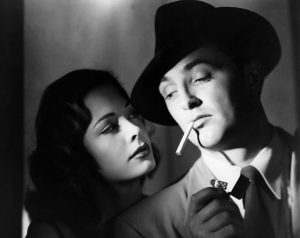
“Out of the Past” (1947)
Robert Mitchum stars as a former private eye with such a shadowy past that he’s determined to start again with a new job, new town, and new girl; Kirk Douglas stars as the gangster just as determined to keep him in the mix. With the bright shadows of Tahoe and San Francisco, direction by dark master Jacques Tourneur (“Cat People”), and a script adapted by Daniel Mainwaring from his own novel (under the pseudonym Geoffrey Homes) it’s no wonder that Roger Ebert called this one of the best film noirs of all time.
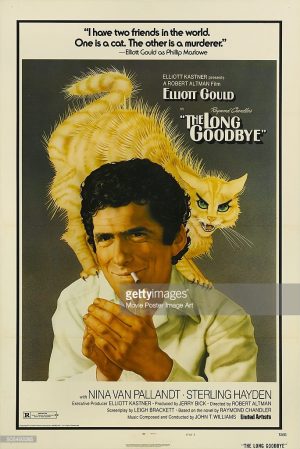 “The Long Goodbye” (1973)
“The Long Goodbye” (1973)
Given that the 1970s were when the outsiders took over the big film studios, it’s no surprise that this decade can be described as the sunshine noir heyday. There’s Jacques Deray’s “The Outside Man” (1972), Roman Polanski’s “Chinatown” (1974), and Arthur Penn’s “Night Moves” (1975), for starters. But my favorite always will be “The Long Goodbye,” Robert Altman’s 1973 adaptation of the Raymond Chandler novel. Starring a perfectly shambling, perfectly rakish Elliott Gould as wiseass detective Philip Marlowe ensnared in an L.A. murder plot involving self-help gurus, boozy writers, gangsters, and a dead wife, it retains the straight spine of the classic noir while basking in Altman’s ramshackle, smirky style. This works on every level, including as a bridge between old and new Hollywood.
“Jackie Brown” (1997)
Given the swell of independent sensibilities in 1990s mainstream film, it’s also no surprise that this decade was the next zenith of sunshine noir. Bridget Fonda starred as a Venice, California, hit lady in “Point of No Return,” John Badham’s surprisingly good 1993 remake of “La Femme Nikita.” Curtis Hanson delivered in 1997 a pitch-perfect adaptation of 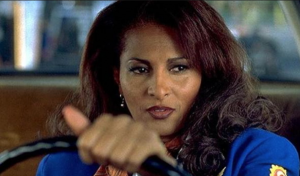 James Elroy’s corrupt Los Angeles cop drama “L.A. Confidential,” the Coen Brothers weighed in with their 1998 California-gold cult fave “The Big Lebowski,” and Quentin Tarantino knocked everyone’s socks off with such sun- and blood-drenched thrillers such as “Reservoir Dogs,” “Pulp Fiction,” “True Romance,” and “From Dusk Til Dawn.” (He wrote, but did not direct, the latter two.) But the best example of nineties sunshine noir is “Jackie Brown,” Tarantino’s 1997 uncharacteristically modest adaptation of the Elmore Leonard novel. Starring a slightly too-ripe-on-the-vine Pam Grier, Robert DeNiro, Robert Forster, and Fonda (arguably the queen of nineties noir), it hones in on a shabby So-Cal region in which a down-on-her-luck flight attendant (Grier) running cash for small-potatoes arms dealer Ordell Robbie (Q.T. muse Samuel L. Jackson) ends up playing the feds against the gangsters. With admirably low stakes and a lot of grownup regret, “Jackie Brown” is the most mature film Tarantino has ever made.
James Elroy’s corrupt Los Angeles cop drama “L.A. Confidential,” the Coen Brothers weighed in with their 1998 California-gold cult fave “The Big Lebowski,” and Quentin Tarantino knocked everyone’s socks off with such sun- and blood-drenched thrillers such as “Reservoir Dogs,” “Pulp Fiction,” “True Romance,” and “From Dusk Til Dawn.” (He wrote, but did not direct, the latter two.) But the best example of nineties sunshine noir is “Jackie Brown,” Tarantino’s 1997 uncharacteristically modest adaptation of the Elmore Leonard novel. Starring a slightly too-ripe-on-the-vine Pam Grier, Robert DeNiro, Robert Forster, and Fonda (arguably the queen of nineties noir), it hones in on a shabby So-Cal region in which a down-on-her-luck flight attendant (Grier) running cash for small-potatoes arms dealer Ordell Robbie (Q.T. muse Samuel L. Jackson) ends up playing the feds against the gangsters. With admirably low stakes and a lot of grownup regret, “Jackie Brown” is the most mature film Tarantino has ever made.
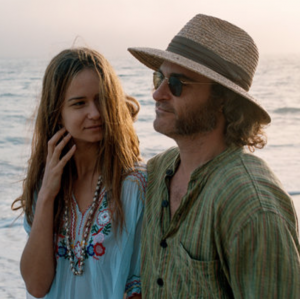 “Inherent Vice” (2014)
“Inherent Vice” (2014)
If “The Big Lebowski” is the ultimate movie about stoners, this adaptation of Thomas Pynchon’s 2009 novel is the ultimate stoned movie. With its charmingly addled plot involving Doctor Feelgoods, California real estate magnates, and beach bums masquerading as feds, it also feels like a stepchild of “The Long Goodbye.” Whatever, man. It’s practically impossible not to be subsumed by P. T. Anderson’s lavishly light-footed odyssey starring Joaquin Phoenix as a perpetually high private eye embroiled in a whole mess of Southern California surfer espionage. With a supporting cast including Owen Wilson, Josh Brolin, Michael K. Williams, and Martin Short, this sunburst of a noir was mostly rejected by critics and audiences alike. In the years to come I’m confident it’ll gain “Lebowski” status, anyway.
This originally appeared in Signature.
